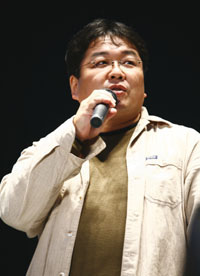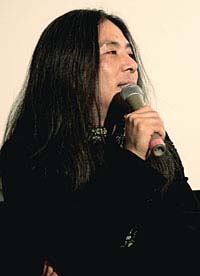Junichi Fujisaku & Chiaki J. Konaka double interview (3)
Real Drive and Ghost Hound are both based on Shirow Masamune's story concepts, but in order to be adapted into full TV series, they obviously needed the work of experienced screenwriters.
In this four-part interview series, we talked with Junichi Fujisaku and Chiaki J. Konaka, series composers for Real Drive and Ghost Hound respectively, and asked about their different approach to Shirow's world, anime storytelling, character development and even voice recording sessions!
 | Junichi Fujisaku - Born on August 6, 1967. Director, scriptwriter, game designer and novelist. He joined Production I.G as Game Production Department Chief Director, but soon became one of Team Oshii's core members, participating to the creation of the theatrical feature Blood: The Last Vampire (2000). The girl in sailor suit fighting monsters with a Japanese sword was in fact Fujisaku's idea. For the Blood franchise he also directed the game version and wrote the novelization. Fujisaku also gave his valuable contribution to the expansion of the Ghost in the Shell world, writing the scripts for many episodes of the Stand Alone Complex series, producing and directing the game version for PS2, and writing three related novels. In 2005 he debuted as a TV series director with Blood+. Besides Real Drive, he wrote the scripts for the FX live action TV series Phone Braver 7, directed by Takashi Miike. |
 | Chiaki J. Konaka - Born in Tokyo on April 4, 1961. Scriptwriter and novelist. His most famous works include The Big O (series composition and scripwriter, 1999) , Serial Experiments Lain (series composition and scripwriter, 1998), Hellsing (series composition and scripwriter, 2001), RahXhefon (scripwriter, 2002), Texhnolyze (series composition and scripwriter, 2003), and Kino's Journey: The Beautiful World - The Land of Sickness -For You- (screenplay, 2007). Other from animation, he also wrote scripts for the SFX series Ultraman Tiga (directed by his brother Kazuya) and for Takashi Shimizu's acclaimed J-horror movie Marebito (2004), based on his own novel. A renown H.P. Lovercraft estimator, Konaka is also a bass player in the band #3b3 Orchestra. |
Part 3: Voices
Do you attend every voice recording session?
Konaka: Yes, I do. When I tag up with Director Nakamura, I am responsible for scripting dialogues and the voice recording process. But I don't attend the synch and mix sessions. Director Nakamura loves the process of constructing music and sound effects comprehensively and I stay away.
Fujisaku: I do try to go to voice recording sessions too. I would pass on the idea of the sound and audio I had while designing the project. I hope to be rightly responsible for the parts I write that are put into sound.
How about the casting auditions?
Fujisaku: I am pleased I had time to attend auditions for all the major characters. As for the protagonist, Haru, he is basically an old man, so I looked for someone who would sound old naturally, but I wanted him to do the younger voice as well, so it was quite tricky.
Konaka: You mean, the same person is doing both?
Fujisaku: Sure. One voice actor is doing a double role. In the end, I decided on Katsuji Mori. I think he did quite a good job.
Konaka: Oh, I see. (nod)

Fujisaku: But Kushima is 180 degrees different from Haru. He is young physically, but he's supposedly gained years accordingly. It was a hard one to decide too, but at the end of the day, we came to realize he should be a typical cool guy and we unanimously decided on Keiji Fujiwara.
Konaka: I am a fan of his acting.
Fujisaku: I had worked with Fujiwara-san once before, so I knew the range of dialogue length he is comfortable with. That would make things very easy. I was really looking forward to how he would develop the character.
Konaka: As for Ghost Hound, we did an outrageous number of auditions. We still couldn't decide on the main character Taro. Initially, we weren't clear whether we would use a male or female voice even. We once thought a child's voice might fit and asked some kids of a children's acting group to come for an audition, but that didn't go well either. We had to wait until Sound Director Yota Tsuruoka brought his best-kept secret, Kensho Ono, the voice of Harry Potter. If we couldn't decide at that point, I don't think this project would have lasted.
Fujisaku: The voice and the acting don't move together as you wish.
Konaka: When finally settled, I felt very relieved.
(3 - to be continued)
© 2007 Production I.G · Shirow Masamune / GHOST HOUND Production Committee
© Production I.G/Shirow Masamune
© 2008 DNDP, VAP, Production I.G

![WORK LIST[DETAILS]](/contents/works/design/images/left_title.gif)



 terms of use
terms of use